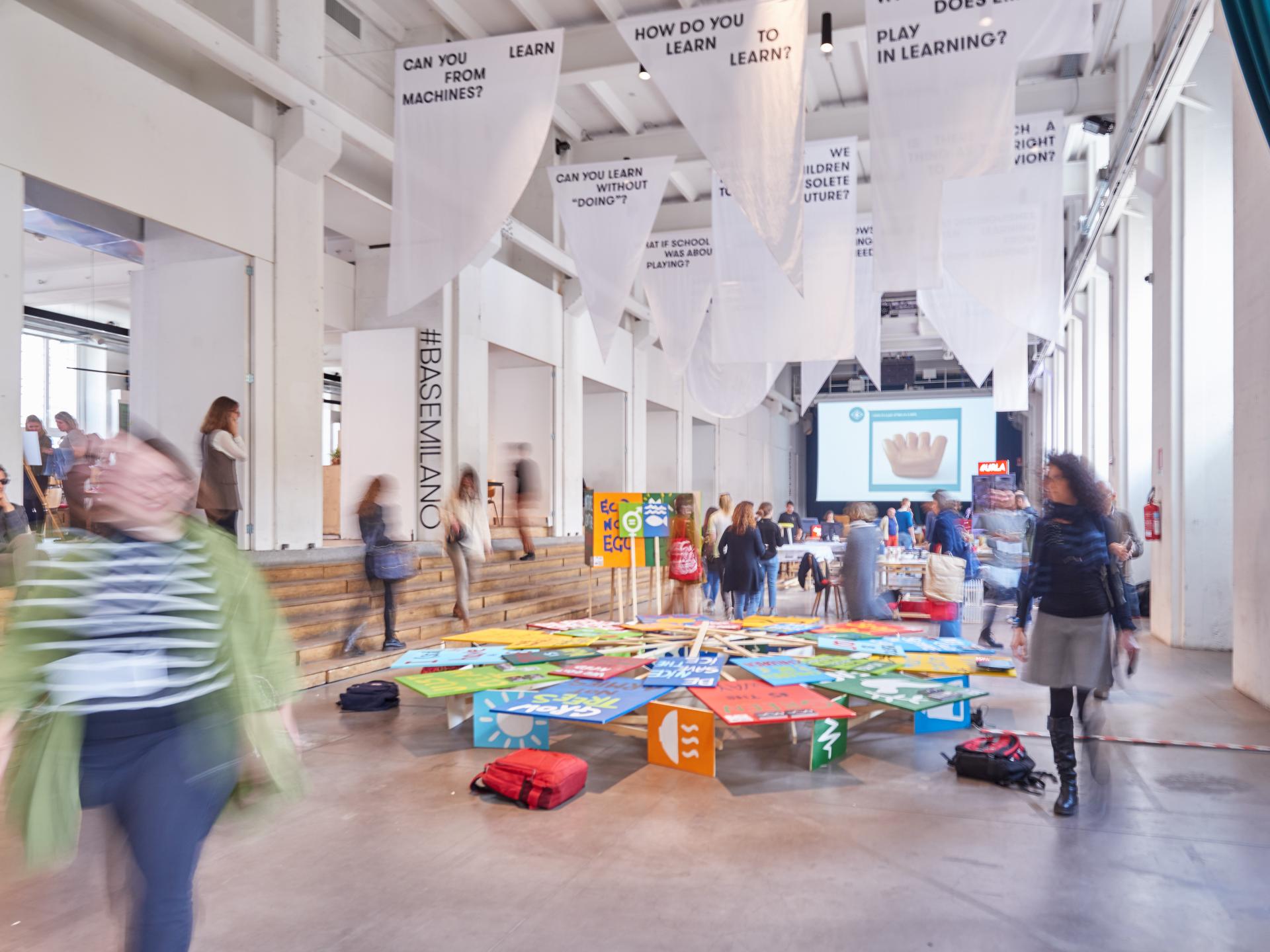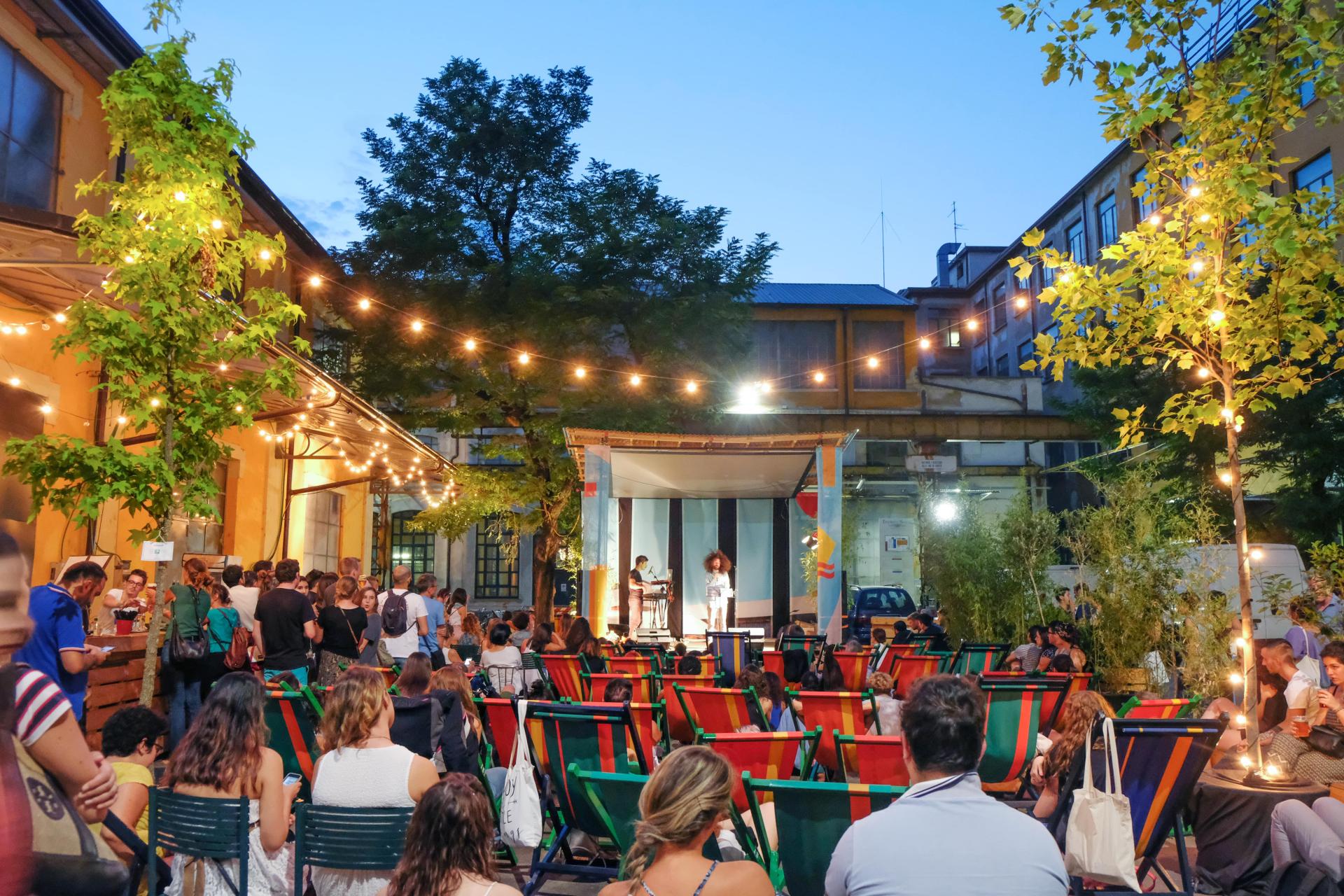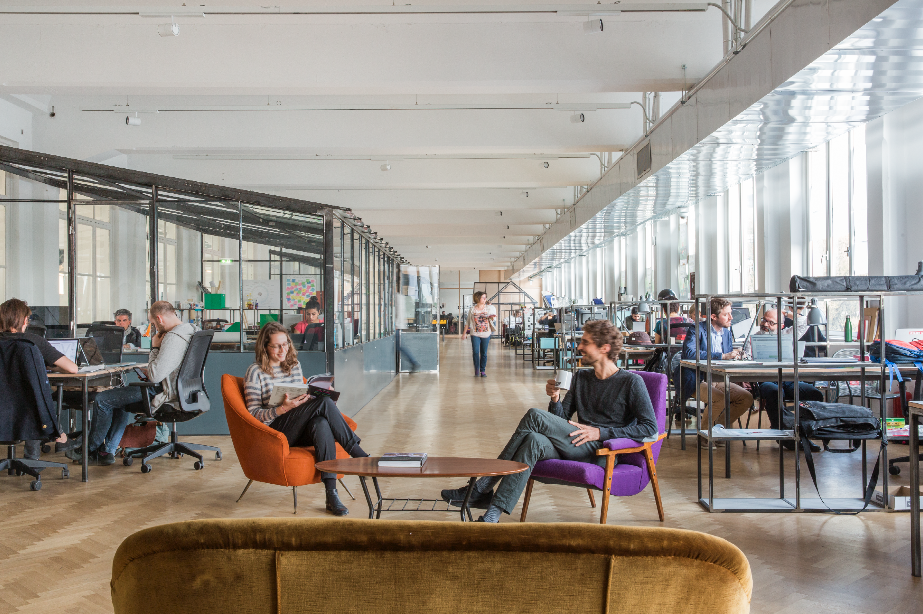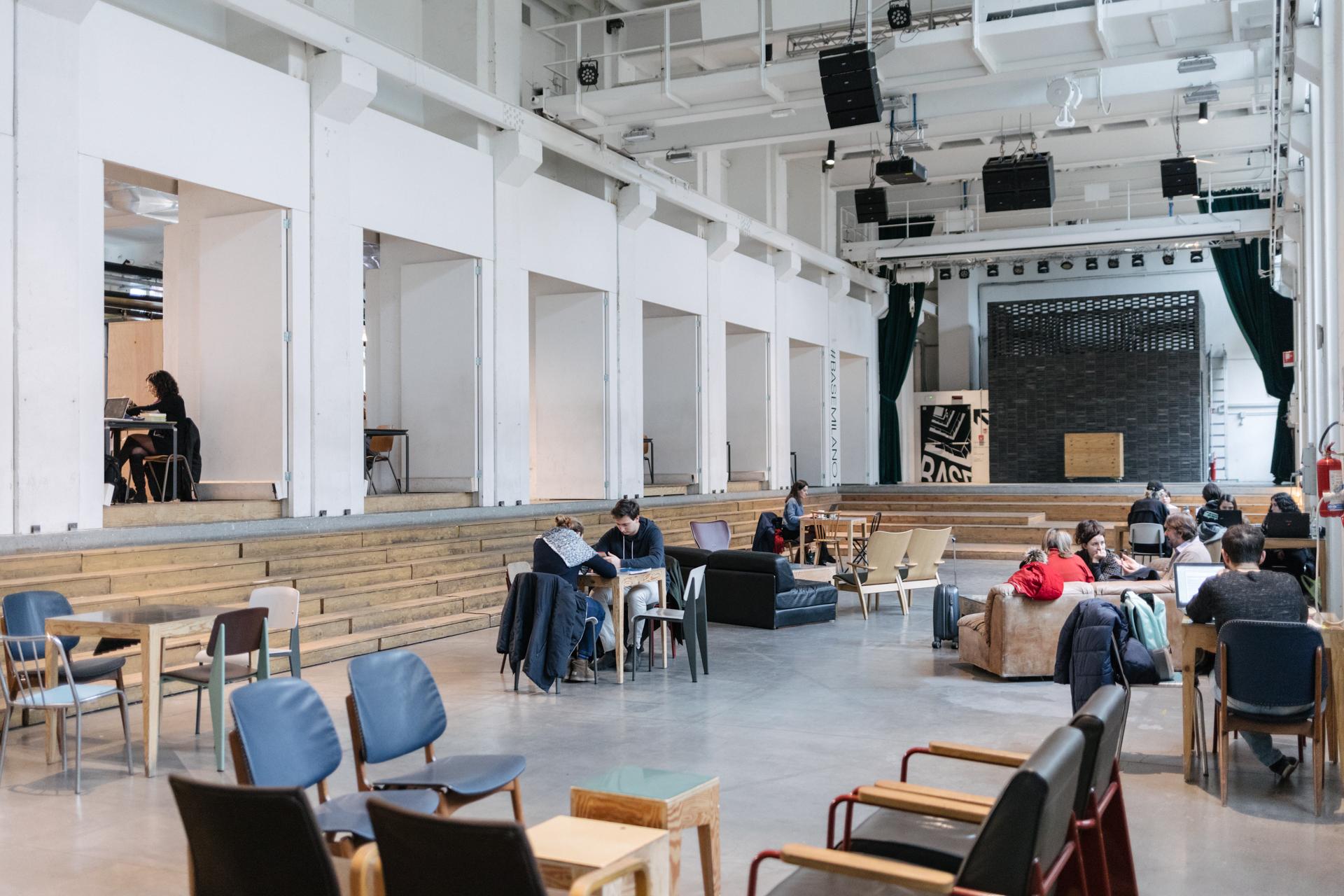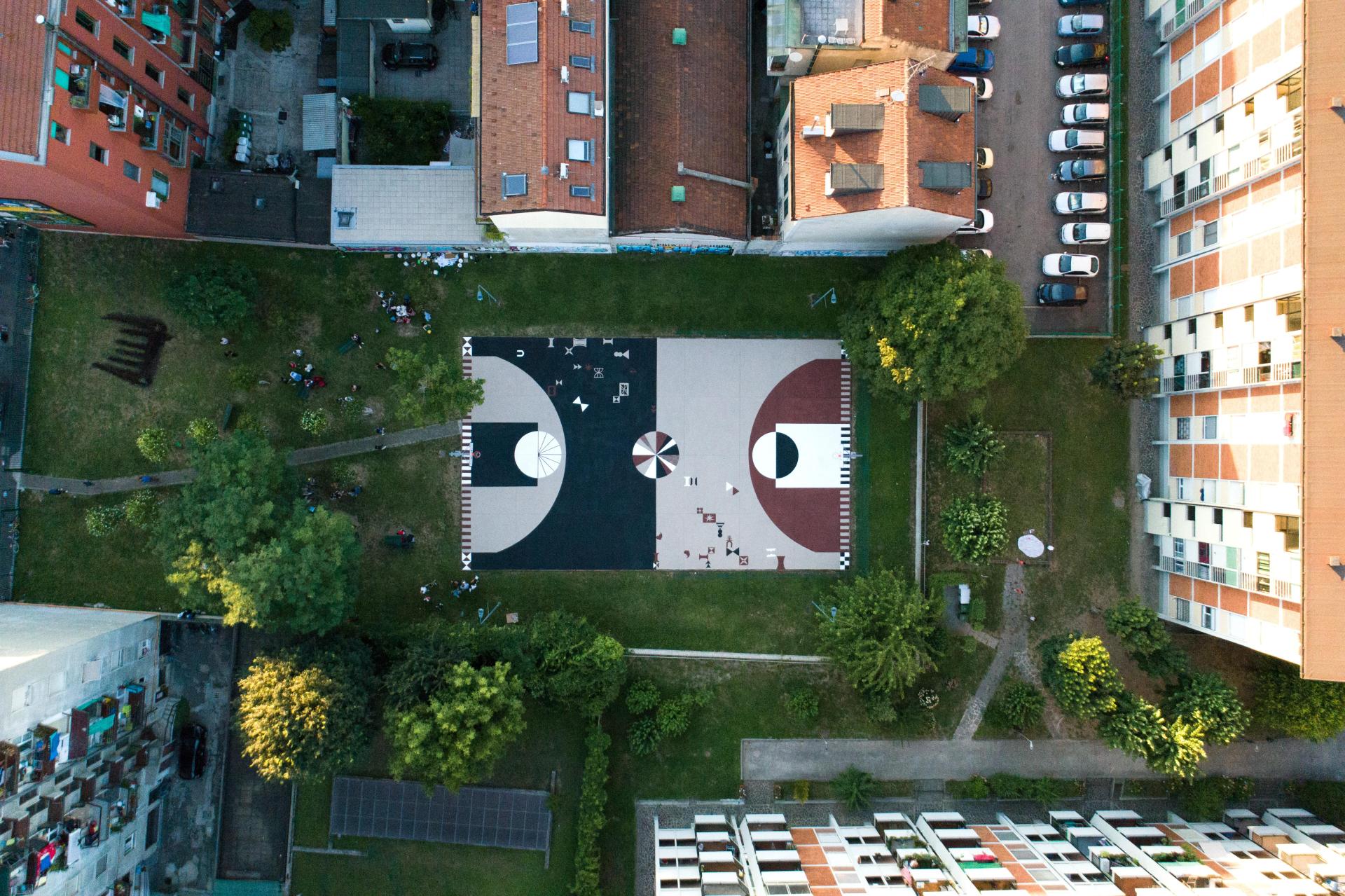BASE Milano
Basic information
Project Title
Full project title
Category
Project Description
Urban regeneration, civic engagement and cultural innovation. Managed by Oxa Srl Impresa Sociale, BASE is the most vibrant part of the widest culture-led urban regeneration project in Italy within the ex-Ansaldo industrial complex. BASE is the result of a unique model of collaboration between the public and private sectors. BASE is a multifunctional creative hub for cross-pollination between arts and entrepreneurship, experimenting transdisciplinary cultural practices for social inclusion.
Project Region
EU Programme or fund
Description of the project
Summary
BASE is a creative and community hub in Milan, located in the heart of the former Ansaldo factory, the cornerstone of one of the widest urban regeneration projects in Europe. BASE is managed by Oxa Srl Impresa Sociale, founded by the consortium that contributed, in partnership with the Municipality of Milan, to the revitalization of the area. As a result, in 2016 Oxa Srl returned to the city a 12,000sqm multifunctional space that consolidated its vocation as a center for cultural initiatives and artistic co-production with a high social value. It strives to reach and involve a larger audience base in order to generate innovative and inclusive reflections for 21st century cities. In fact, BASE is conceived as a hybrid space blending arts, design, technology, business, welfare and social innovation, where creative professionals, artists and citizens can experiment and exchange new languages by sourcing from a variety of disciplines and fields of knowledge - formal and informal - in order to generate diverse visions able to represent and convey the intrinsic plurality of our society.
BASE works in collaboration with important national and international players to offer a 365-days program aimed at investigating contemporary issues. Its facilities include a workspace, ateliers and an artist residence, spaces dedicated to the music industry, an auditorium, a large study room open to the public, learning rooms dedicated to educational activities, a bar and a social concierge, spaces for exhibitions, shows, performances, conferences, workshops and activities for civic engagement. On top of that, BASE overflows and steps outside its boundaries, tailoring to the surrounding neighbourhoods and further urban contexts participatory projects with local communities and stakeholders: tactical urbanism, urban regeneration, civic engagement and empowerment, artistic co-creation against social exclusion and school dropout.
Key objectives for sustainability
BASE sustainability relates to all its domains, which are closely linked:
- Social sustainability in terms of an inclusive and accessible cultural offer and projects that empower communities, involve new audiences, foster active citizenships, promote rights and fight marginalization.
- The business model is based on a diversification strategy that guarantees economic sustainability: spaces rental on a permanent and temporary basis (e.g. co-working spaces, events and location management); revenues generated by permanent services (e.g. bistro, guest house); the partnership with the public administration which has ensured the usage of a space at non-market fee; institutional fundraising (eg. application to grants, sponsorships and donations).
- Environmental sustainability pursued through the urban regeneration process, which meant avoiding land consumption and revitalizing part of the industrial archaeological heritage. Also, through artistic and educational projects BASE promotes co-creation and sharing practices as well as reflections on the issues of climate change and nature/environment.
- Organizational sustainability is achieved thanks to the governance model, the partnerships with stakeholders at multiple levels and the continuous work within the local community. As a result of this recursive process, the organization is capable to intercept their needs and aspirations and to co-create interventions that are more suitable to the local identity. Being member and co-founder of diverse networks of cultural and community hubs at a national and international level, BASE contributes to bringing up relevant issues to policy makers and, in the long term, to generating a new shared approach to urban life quality and cultural welfare.
Key objectives for aesthetics and quality
The renovation of the building is the result of an architectural project that has preserved most of the original features of the former industrial site, in order to convey the identity of the area and build a narrative that connects its history with its contemporary function (from a factory to a “factory of ideas”). The former manufacturing dimension is still preserved in the projects that BASE has been promoting within the design industry, the world of craftsmanship and digital making (eg. an internal carpentry workshop has designed and built most of BASE’s furniture and set-up materials; BASE is the co-founder of a network of enterprises that promotes open innovation in the digital manufacturing). The built/physical environment facilitates social encounters and spontaneous interaction within the space; the layout and the facilities allow both the organization and its users to re-arrange the space in a flexible way according to the different needs and coherently with the hybrid nature of the cultural centre. Moreover, the playful component that characterizes the design of all the furniture, communication signage and physical installations, stimulates interaction. Since its very beginning, BASE has emphasized the aesthetic dimension: the projects implemented both in-house and outside are characterized by a strong visual identity, often developed in collaboration with contemporary artists. This has contributed to foster aesthetic values while enhancing the impact of communication at a local, national and international level. Finally, BASE strives to be a testing ground for creative experimentation through collaborations with schools, universities and academies in a variety of ways: hosting exhibitions and performances, developing field-based research aimed at designing new services/layouts or studying the features of shared working environments. This has often translated into co-productions for the realization of new installations, visual output and design prototype.
Key objectives for inclusion
The transdisciplinary nature of BASE stems from an approach of participation not only at a governance level, but also and above all in the design of the cultural offer. Inclusion, Interaction and Innovation are the core values of the organization. Diversity and inclusion are expressed in terms of: accessibility to the cultural experiences (73% of events have free access, generating an estimated economic and social value of over €3.5M); different ways and places where to make art, cultural contents and processes; means to reach diverse people and involve a larger audience base.
First of all, this has been made possible thanks to the collaboration with stakeholders at multiple levels and with many non-profit organizations that work with different marginalized categories.
Secondly, experimenting with diverse creative languages allows to broaden the variety of potential co-creators: with the PLAYGROUND program of residencies and talks, launched in 2020, BASE has opened its spaces to artists, citizens and professionals in need of spaces during the pandemic; at the same time, it has started a reflection on how we can decolonize cultural institutions and who is in charge.
Thirdly, BASE facilitates culture-led urban regeneration processes and public-art projects outside conventional venues, connecting artists with civil society, such as:
- Immaginare Piazza Tirana (2019), that involved the youth of the neighbourhood in redeveloping the basketball court of a square through street art, self-construction, video making and AR;
- Immaginare Genova (2020), a collective scenario building process with middle and high school students of Genoa that transformed needs, fears and dreams into an urban art open air museum.
Lastly, BASE has established relationships with various schools and organizations to engage young people from fragile backgrounds, aiming at fighting early school drop-out, promoting entrepreneurship education, enhancing soft and relational skills.
Results in relation to category
Every year BASE releases the annual social report to analyse and communicate the results achieved in relation to its mission. Some key figures:
- 450.000 annual visitors
- 15.000 people involved in educational projects
- 210 resident creative professionals
- 12.000 sqm of regenerated public space
- € 10.7 M private investment on a public good
- 80 cultural and social start-ups involved in incubation programs
- 71% employees under 35, 80% female employees
- Estimated social value for the beneficiaries of the initiatives: € 3.5 M
- Estimated investment in the creation of a cultural community: € 4.4 M
In 2020 this process has been further developed with the identification of an impact statement. This in-depth evaluation of the generated social value is not only a report of what BASE has done so far and an analysis of the outcomes, but it also enables the organization to build a shared vision of change. In fact, BASE conceives itself as a dynamic collective entity, continuously changing towards organizational learning. Therefore, the vision of change is put upstream in the process of defining operational goals, underlying both the evaluation of the results and the generated impact, the strategic planning and the organizational coordination. The renewed identity of BASE, necessarily shared by its staff, founders and key stakeholders previously mapped at a local, national and European level, sees the organization as:
- actor, producing cultural content;
- enabler, empowering others to act;
- breeder, fostering synergies, enhancing plurality.
This vision of change has been declined into a 4-area framework: cultural, social, economic and relational value. Each area is embodied in specific expected changes achieved through the implementation of different projects. To measure these results, an impact statement framework has been developed by putting together both output and outcome KPIs for each activity organized to achive an objective of change.
How Citizens benefit
Inclusion, participation and accessibility are the common values expressed in BASE's vision of change within the society. The very nature of BASE is intrinsically connected to the civil society and more precisely to the needs that in 2013 citizens, activists, cultural organizations and creative professionals expressed to the City Council. At that time, there was a strong demand for new spaces for cultural production that eventually led to protests by different bottom-up movements, sit-ins and a public debate around these issues. This public debate also took place in the former Ansaldo building (soon-to-be BASE) where different stakeholders organized a 3-day workshop with participatory roundtables open to the citizens: the goal was to co-design what could have been the future of that area as well as of many other public owned buildings. This process led to new forms of agreement between the Municipality and private organizations: BASE was born thanks to a new model of PPP and the virtuous encounter of bottom-up forces and top-down policies aimed at generating social innovation and cultural welfare through urban regeneration. This dates further back to the 1990s when the Municipality of Milan purchased the ex-Ansaldo area with the aim of promoting cultural initiatives. In 2014 a joint venture made up of 5 associated non-profit and profit organizations (Accapiù Srl, Arci Milano, Associazione Culturale Aprile, Avanzi Srl and Make a Cube Srl) won a public tender, which entrusted that portion of ex-Ansaldo factory to the self-financed joint venture that became a private non-profit social enterprise: Oxa Srl Impresa Sociale, which eventually opened BASE in 2016. The public administration entrusted Oxa Srl to plan and manage the operations of BASE for 18 years and granted a favourable annual rent. In exchange, Oxa Srl co-financed the refurbishment (€ 5 M from the Municipality, € 10 M from Oxa Srl).
Innovative character
The innovative governance and business model, previously described, contributed to make BASE a national reference point in the field of culture-led urban regeneration. Thanks to its hybrid nature BASE works both as a creative hub (a place dedicated to creative professionals) and as a community hub (an open place that offers services to citizens). This has been made possible thanks to the multipurpose workspace and the strategic vision in articulating the operations in a broad range of services and functions that combine non-profit with business activities.
The simultaneous carrying out of a variety of activities in the same place underlies the prolific environment where creative professionals, artists, social innovators and technology start-uppers work together.
Multidisciplinarity is at the core of BASE’s vision and has driven its strategic choices in the development of many projects in co-production and partnership with several actors. The underlying objective is investigating issues of collective relevance (eg. living and urban changes, the man-machine relationship, the transformations in the world of work) through the experimentation of multiple creative languages and the activation of a variety of formats (eg. artist residencies, temporary exhibitions, workshops, tactical urbanism, etc.).
This multidisciplinary approach has recently led to prototyping an innovative learning model: “Learning Machine” is a pilot project launched in 2021 that aims at experimenting non-formal learning practices through the adoption of a wide spectrum of creative languages and disciplines, in order to find new visions for the future and transfer soft & relational skills to face the complexities of our time. Thanks to a transgenerational character and a strong multidisplinary dimension, the project wants to leverage on BASE’s experience, networks, material and immaterial assets, in order to become a testing ground and a platform for experimental learning.

